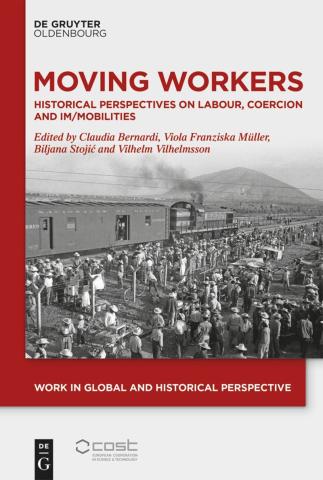
COST Action WORCK,
dear colleagues interested in the study of labour and coercion,
we are very proud to inform you about the publication of a couple of WORCK-related research results.
First of all, the De Gruyter Volume on “Moving Workers: Historical Perspectives on Labour, Coercion and Im/Mobilities”, co-edited by Claudia Bernardi, Viola Müller, Biljana Stojic and Vilhelm Vilhelmsson has just been published and is now accessible open access: https://www.degruyter.com/document/doi/10.1515/9783111137155/html. The book, that is built on a 4-years discussion in the WORCK working group “Im/Mobilisations of the Workforce”, explores how workers moved and were moved, why they moved, and how they were kept from moving. Combining global labour history with mobility studies, it investigates moving workers through the lens of coercion.
Likewise, the special issue on “Work Semantics”, is currently being published in the Austrian Journal of Historical Studies. While the online version can already be accessed (https://journals.univie.ac.at/index.php/oezg/issue/view/649), the printed version will be out within the next few days. Co-edited by Claude Chevaleyre and Juliane Schiel, the issue presents the historical semantics approach of the WORCK working group “Grammars of Coercion” and some pioneering empirical case studies that seek to analyse languages of coercion from different world regions and time periods.
Furthermore, the special issue on “Gender, War and Coerced Labor”, co-edited by Julia Heinemann, Christine de Matos, Fia Sundevall and Anders Ahlbäck and other members of the WORCK working group “Intersecting Marginalities” has recently been published in the renowned journal “Labour History” and can be accessed online: https://www.tandfonline.com/toc/clah20/64/3. The issue emphasizes the role of coercion in war labour and expands the scope of our understanding about labour’s interplay with gendered war-related tasks as carried out in different spheres, ranging from the armed forces and auxiliarly services to agricultural and industrial production and civil organisations.
And finally, the wonderful exhibition on “Coercion and Wage Labour” that many of you have seen at the second WORCK Conference in Vienna two years ago, has now been transformed and expanded into a virtual exhibition that is meant to accompany the eponymous collected volume that will be published soon. The virtual exhibition is the collaborative work of Anamarija Batista and Corinna Peres as curators and dramaturgs, of Anna Hofbauer for the exhibition design, of Monika Lang, Tim Robinson and Dariia Kuzmych as illustrators, of Colin Arnaud, Marjorie Carvalho de Souza, Mohammad Tareq Hasan, Gabriele Marcon, Nataša Milićević, Müge Telci Özbek, Ivanka Petrova, Nico Pizzolato, Akın Sefer, Ljubinka Škodrić, Sigrid Wadauer as text authors, and of Teresa Petrik for the online design.
Our fourth and penultimate grant period has just ended with a lively and inspiring international conference in Prague and a very productive reflection meeting in Reykjavik.
We would like to congratulate the editors, authors and contributors of the three publications and the virtual exhibition and thank the organisers of the Prague conference and the Reykjavik meeting for two wonderful events.
Last of all, we would like to seize the opportunity and draw your attention to three open calls for research positions at the Viennese Department of Economic and Social History:
- one postdoc position in the field of global economic and social history and in the research cluster “Global History” (6 years): https://jobs.univie.ac.at/job/University-Assistant-postdoctoral/1001248001/
- one postdoc position in the field of late medieval economic history (4 years): https://jobs.univie.ac.at/job/University-Assistant-postdoctoral/998213901/
- one doctoral position in the field of late medieval and early modern social history (4 years): https://jobs.univie.ac.at/job/University-predoctoral-position/996496701/
With this, we are now looking forward to our last 6 months of COST funding and the publication of further WORCK-related research and are curious to see which new directions this network will take from 2024 onwards.
With our best wishes,
Johan Heinsen and Juliane Schiel
